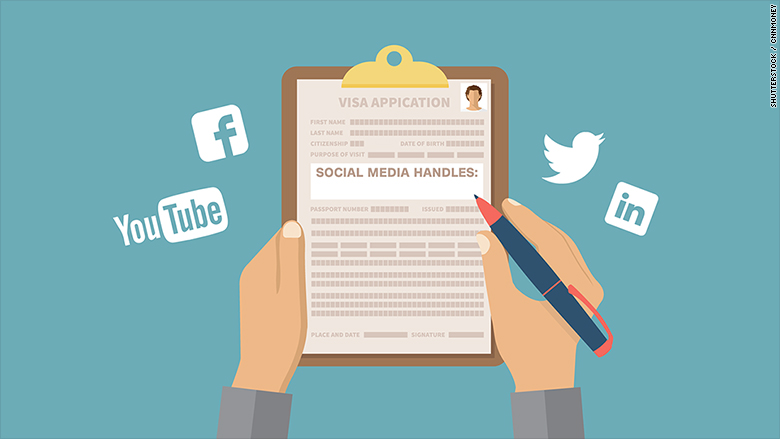
Note to all visitors: The Department of Homeland Security wants to follow you on Twitter.
U.S. Customs and Border Protection agency wants to add social media information boxes to the form travelers have to fill before arriving in the U.S.
The department wants to add the following question to the visa and arrival forms: "Please enter information associated with your online presence—Provider/Platform—Social media identifier."
When it first proposed the new question, the department said it would be marked as "optional." But leaks of the latest version of the proposed form suggest it could become compulsory.
The leaked form was published by the digital rights advocacy group Access Now.
The CBP said in a statement to CNNMoney, "Collecting social media identifiers...may help detect potential threats because experience has shown that criminals and terrorists, whether intentionally or not, have provided previously unavailable information via social media that identified their true intentions."
The idea has sparked a lot of criticism from privacy campaigners. A coalition of human rights and civil liberties organizations has sent an open letter to the Department of Homeland Security, urging it to withdraw the proposal.
They said the change would "invade individual privacy and imperil freedom of expression while being ineffective and prohibitively expensive to implement and maintain."
More than 700 people submitted public comments about he proposal, mostly rejecting it as unnecessary and too expensive.
Related: Microsoft sues government for secret searches
Visitors coming to the U.S. have to apply for visa, unless they come from one of the 37 countries that have negotiated a visa-waiving program for their citizens. These include, for example, most of the EU countries, Australia, South Korea and Chile.
But even visitors from these countries have to apply for a permission to visit the country at least 72 hours before their scheduled arrival in the U.S. The application takes 20 minutes to complete and costs $14.
In addition, all non-American visitors coming to the U.S. have their fingerprints taken at the border.

